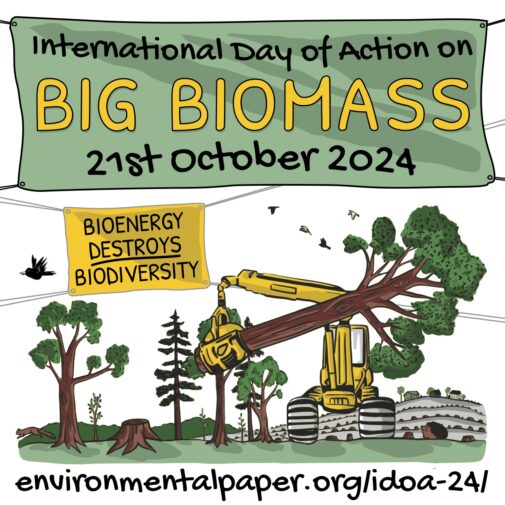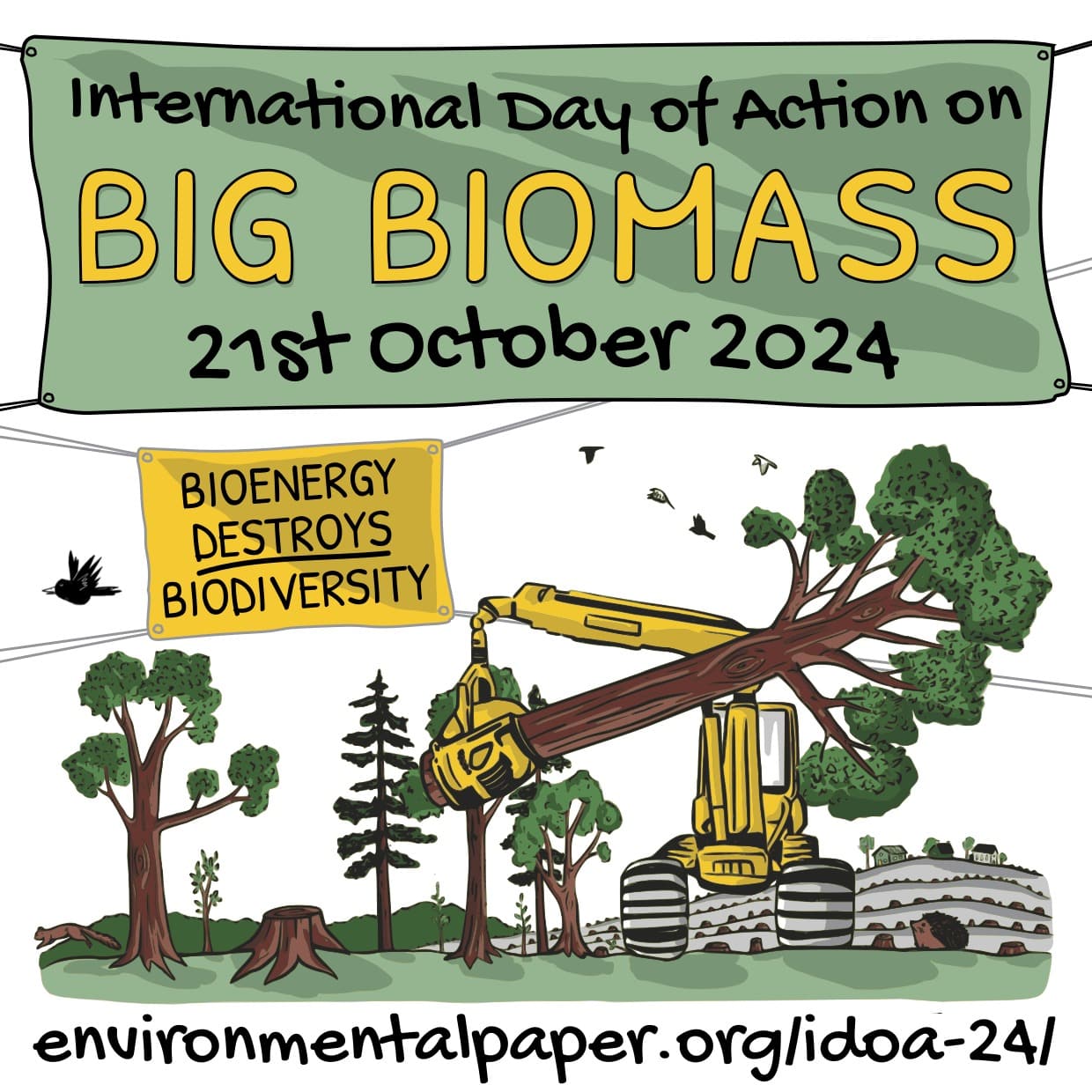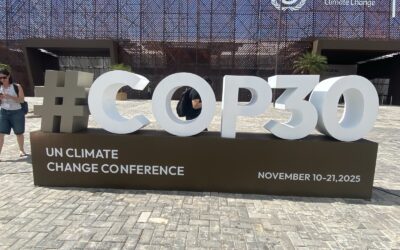NGOs around the world are participating in a global wave of action against large-scale biomass energy, to tell world leaders at COP16 that Bioenergy Destroys Biodiversity.
On the 21st of October 2024 environmental and civil society groups from around the world will take a stand against large-scale forest biomass burning to produce energy. The international day of action coincides with the start of the Convention on Biological Diversity taking place in Cali, Colombia and activists are drawing particular attention to the devastating impact that logging forests to supply biomass is having on the world’s wildlife and ecosystems.
Tokyo / Hobart / Jakarta / Togo / Berlin / London / Helsinki / Vancouver / Washington / Bogotá and more, 21st October 2024 – The Biomass Action Network, a coalition of more than 200 civil society groups, will take action today – on the International Day of Action on Biomass – to highlight the negative environmental and social impacts of burning biomass on an industrial scale to generate energy. Burning forest biomass is a false energy solution to climate change. It emits at least as much CO2 as burning coal per unit of energy produced and has high environmental and social costs.

Biomass is obtained by chopping down trees to make wood chips or pellets that are then burned in power stations. One of the worst ways this can be done is by clearcutting natural, native forests, as these are typically the most species rich. Indeed, investigations have shown that some of the world’s largest wood pellet manufacturing companies, including Enviva and Graanul Invest, buy their wood from companies that are clearcutting pristine forests in the U.S. Southeast, Estonia, Latvia, and Canada. This has led to steep declines in biodiversity, among other impacts. As the biomass industry expands its global reach, natural forests, other ecosystems, and vital agricultural land are all threatened by conversion to monoculture ‘energy’ plantations.
Unfortunately, outdated policy and lucrative financial support in the form of government subsidies, means that the demand for biomass is increasing globally. This is leading to more intensive forestry practices, such as shortening rotation periods. When logged forests (either natural or managed) are not allowed to regrow to maturity, there are fewer old trees and so there is less dead wood available. Dead wood is an essential element of a forest ecosystem, as it supplies nutrients for plants, fungi and insects, as well as provides homes to many species, which cannot survive without it.
And when a natural ecosystem is replaced by a monoculture tree plantation to supply biomass, biodiversity is irretrievably lost, because single-species plantations do not support the same range of wildlife as natural, multi-species ecosystems do. Drax power station in the UK imports wood from, amongst other places, monoculture tree plantations in Brazil’s Rio Grande do Sul region. The establishment of these plantations have been linked to the disappearance of several grassland bird species locally, including ones which are threatened with extinction on the IUCN Red List. In Indonesia, plans to replace native forests and other ecosystems with fast-growing timber to supply the biomass industry, is threatening critically endangered orangutan populations.
To draw attention to these impacts on biodiversity, members of the Environmental Paper Network’s Biomass Action Network will be taking action today – from Australia to Asia, Africa and Europe, and the Americas. You can follow the wave of events and activities on our social media accounts (X, IG, FB) #BigBadBiomass as well as on our website. The program of the day can be found here.
The Biomass Action Network has more than 200 member groups in nearly 60 countries. The basis for our work is The Biomass Delusion, a position statement which articulates that burning forest biomass for energy is exacerbating the climate crisis.
Quotes
Quote (1) Peg Putt, Biomass Action Network, Australia said: “Inflicting damage on natural forests, accelerating land grabbing and monoculture plantation expansion, exposing disadvantaged communities to pollution, all whilst accelerating both climate change and the biodiversity crisis, are some of the impacts being highlighted in today’s wave of action on big biomass.”
Quote (2) Kwami Kponzo, Global Forest Coalition, Togo said, “The creation of monoculture tree plantations is a key driver of biodiversity loss in Africa. The forestry industry already has a track record of causing water, soil, and air pollution here, and growing demand for biomass will only exacerbate these impacts, as we have already documented in a case study from Ngodwana, South Africa.”
Quote (3) Diego Oyarzo, Colectivo Viento Sur, Chile said, “The biomass industry for energy production intensifies the colonial occupation of our Abya-Yala; a territory today recognized as Latin America and the Caribbean, sacrificing the biodiversity and ancestral culture of the peoples who have protected it for millennia.”
Quote (4) Pete Dean, Biofuelwatch, UK said, “The UK government has promised us “Clean power by 2030” and announced plans to plant millions of trees. However, this will be completely undone if it persists with its plans to continue the life of the single largest tree-burning enterprise in the whole world. Drax power station gets public subsidies of almost £1.5 million a day, for burning trees taken from some of the most biodiverse ecosystems on the planet. On the day of action we’ll be outside Westminster in London and across the UK calling on our MPs to stop new forest destroying subsidies.”
Quote (5) Amalya Oktaviani, Trend Asia, Indonesia said, “Wood biomass energy is driving a modern form of colonialism in tropical rainforest nations like Indonesia. Industrial timber plantations have historically caused deforestation, displaced indigenous communities, and reduced biodiversity. The growing demand for wood pellets as an energy source is now being used to justify further exploitation of these crucial forests.”
Quote (6) Michaela Kruse, Ausgebrannt, Germany said, “Activists in six German towns, Berlin, Cuxhaven, Hamburg, Leipzig, Weilheim and Wilhelmshaven, are organising events and banner actions against big biomass developments today. Our message is that woody biomass demand needs to be reduced now and no more subsidies should be paid for this harmful form of energy. Wood burning is a fake renewable which threatens our climate, the forests and our health.”
Contact Information:
Sophie Bastable
Coordinator of the International Day of Action on Big Biomass for the Environmental Paper Network (EPN), Portugal
sophie@environmentalpaper.org +351 965 565 711 (UTC +1)




